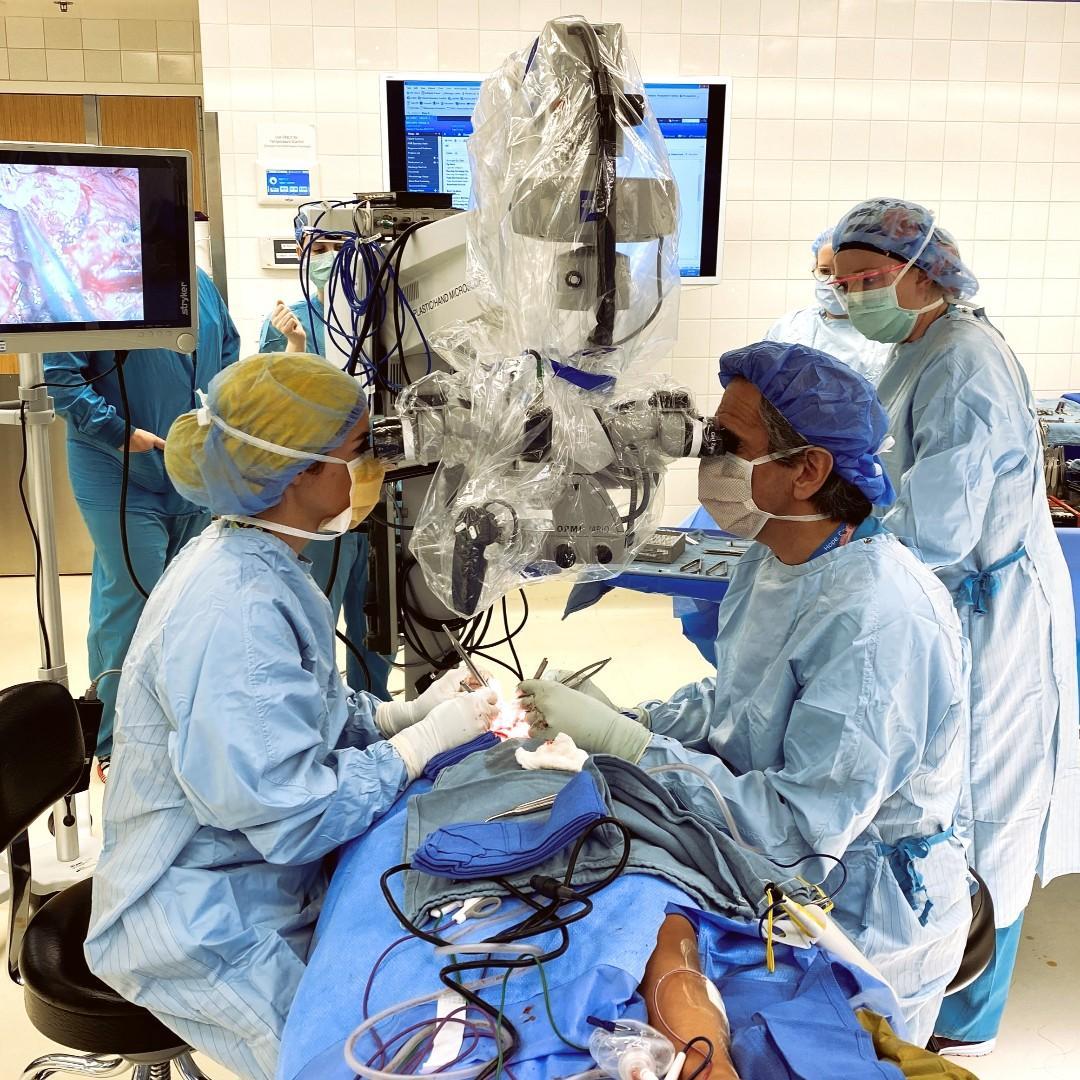Head & Neck Oncology and Microvascular Reconstruction Fellowship
Overview
The program is designed to provide advanced clinical training in extirpative surgery, complicated salivary/endocrine surgery, microvascular reconstruction, skull base surgery, and transoral robotic/transoral laser endoscopic approaches. The program also offers intensive research mentoring with the intent to support the development of clinician researchers who are planning an academic career.
The head and neck fellowship is divided into major areas, including surgical oncology and microvascular reconstruction, TORS, skull base surgery, radiation oncology, and medical oncology. The fellow will be exposed to surgical pathology, maxillofacial prosthetics, and speech rehabilitation.
Length of fellowship: 1-year Clinical Fellowship
Number of Positions Available: 1
Fellowship Details
During clinical rotations, the fellow will work directly with faculty members in the care of each patient. The fellow will be responsible for overseeing the initial evaluation and work-up of tumor patients, coordination of multidisciplinary care, and inpatient and outpatient follow-up. The fellow will function as either operating surgeon or first assistant under the supervision of the appropriate attending physician. One of the goals of the fellowship is to foster the growth of surgical teaching skills by having the fellow first assist the residents in basic head and neck procedures. The fellow plays a major teaching role in taking residents through many of the standard procedures (parotidectomy, thyroidectomy, neck dissections and the like) as well as intense surgical experience in advanced cases. Participation in microvascular reconstruction is a major component of the clinical experience.
The fellow has attending and admitting privileges. He/she will have one half-day independent clinic per week focusing on general otolaryngology and basic head and neck oncology. Surgical cases derived from this clinic will be performed independently by the fellow. The fellow will also oversee the head and neck service, participate in the weekly head and neck multidisciplinary tumor board, and take part in the attending on call rotation.
Clinical Research
This training program is intended to foster the fellow’s evolution as a clinician investigator. As such, clinical research for this year is a major focus. Potential research mentors in both basic science and health services research and available to the fellow. The fellow may seek a mentor in any appropriate department at the University. After identifying a mentor, the fellow is expected to present a formal research plan to the Head and Neck faculty and Department Research Committee. The Research Committee will continue to critique and monitor the progress of the fellow’s research project. The fellow can take advantage of the Otolaryngology Research Group to help mentor his/her research. In addition, for fellows interested in staying for an additional 1-2 years of laboratory-based research, the Solid Tumor Translational Research Program at the Fred Hutchinson Cancer Research Center is the umbrella organization which brings together investigators from University of Washington and Fred Hutchinson Cancer Center in translational solid tumor research. The Head and Neck Translational Research Group currently has approximately 5 Principal Investigators and research laboratories which conduct applied research in head and neck cancer. Fellows interested in basic/translational research should commit 1-2 years of dedicated research time.
Fellowship Contact Information
Program Director:
Brittany Barber, MD, MSc
bbarber1@uw.edu
Associate Program Director:
Neal Futran, MD, DMD
nfutran@uw.edu
Program Coordinator:
Jason Gordon
jasong08@uw.edu
Recruitment Coordinator:
Vanncy Crookes
poeuvv@uw.edu
Important Dates and How to Apply
Deadlines and application information can be found directly on the American Head & Neck Society website.
Clinical Sites
Fred Hutchinson Cancer Center
Seattle Cancer Care Alliance brings together the leading research teams and cancer specialists of Fred Hutch, Seattle Children's, and UW Medicine.
Otolaryngology-HNS at UW Medical Center - Montlake
Our highly trained surgeons, providers, nurses and support staff treat patients with disorders such as chronic sinusitis, dizziness, cancer and the loss of ability to hear, speak and/or swallow.
Fellows and Faculty
Brittany R. Barber, MD, MSc
ASSOCIATE PROFESSOR
Sida Chen, MMD
HEAD AND NECK ONCOLOGY FELLOW (2025-26)
Rocco Ferrandino, MD
ASSISTANT PROFESSOR
Neal D. Futran, MD, DMD
PROFESSOR
Emily Marchiano, MD
ASSISTANT PROFESSOR
Zain Rizvi, MD
ASSOCIATE PROFESSOR

